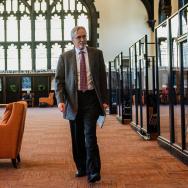Editor’s note: This story is part of ‘Meet a UChicagoan,’ a regular series focusing on the people who make UChicago a distinct intellectual community. Read about the others here.
In early March, Axios journalist Alexi McCammond, AB’15, was preparing to cover a Super Tuesday rally for Sen. Bernie Sanders at a Vermont gym when she got a tip that Michael Bloomberg might drop out of the Democratic race.
She ran outside in the rain, away from the noise of the 5,000 rallygoers, to call her source. The next morning, just an hour before Bloomberg’s announcement went public, she finished writing the story on her phone, with her editor on speaker, while searching for her rental car in the hotel parking lot.
Breaking the Bloomberg story was one of her proudest moments on the campaign trail. But during an unprecedented year, in which the country has faced the COVID-19 pandemic and grappled with discussions about race and police violence, McCammond has felt a sense of gravity amid the mad rush of the news cycle.
“To play a very small part in this moment, and to realize the responsibility that this job entails in going on TV and talking about these things—at a time when I feel personally very concerned about systemic racism and police brutality—that makes me so happy to do what I do,” she said.
After speaking earlier this month at a virtual Institute of Politics event, McCammond reflected on how her time at the University prepared her for her career.
“I’m so grateful now, in the absence of what feels like civil political discourse nationally, for [what I learned at UChicago],” she told UChicago News. “If everyone could have a crash course in how to have a conversation, maybe we’d be in a better place right now.”
Forging her own path
When McCammond came to the University of Chicago in 2011 on a full, four-year QuestBridge scholarship, she thought she wanted to be a doctor. College was an opportunity that hadn’t been available to her parents, and growing up in a lower middle-class family, McCammond said she had internalized some pressure to succeed.
But she quickly realized that medicine wasn’t the right path for her. McCammond had always loved writing and following the news: She made zines for her family by cutting pictures out of magazines, stapling them together and making up stories about them as a child.
At UChicago, she wrote for The Gate—an undergraduate publication on politics and policy—where she discovered that she had “the metabolism” for breaking political news. She also studied sociology and Spanish language and literature—subjects that she said broadened her worldview and informed the way she thinks about reporting.
“I wanted to take classes that gave me a better understanding of the way people move about the world,” she said. “Sociology was great for that, because I got exposure to people who I might not have interacted with or observed otherwise. By going through that experience, you learn to remove any biases that you have and understand people better for who they are.”
UChicago’s tradition of discussing and defending viewpoints in class also helped train her for the tough conversations that are essential to political journalism. Being challenged and learning to respond to criticism, she said, “really teaches you how to be genuinely curious, and find comfort in the discomfort when you disagree.”
The analytical mindset she developed at UChicago is one that McCammond carries with her into the field, where she has broken major stories—including one about how President Donald Trump spends hundreds of hours in unstructured “executive time.”
In recent months, her reporting has closely followed the Biden-Harris campaign, voter priorities and swing state polling trends. She has appeared regularly on Axios’ HBO show, where she has landed interviews with Michigan Gov. Gretchen Whitmer, Atlanta mayor Keisha Lance Bottoms, Rep. Jim Clyburn and Rep. Ilhan Omar. McCammond has also appeared on CNN and Fox, and is a contributor to NBC and MSNBC.
Putting 2020 in context
While McCammond has been focused on the presidential race for months, she notes that the moment we’re living in is bigger than Trump. As a young Black journalist, she said this year—marked by police brutality and protests against systemic racism—has presented both opportunities and challenges.
“Newsrooms are engaged in a reckoning,” she said. “They’re looking at themselves in the mirror and realizing how white they are, how they’ve perpetuated systemic racism in their own right, and what they can do to make their companies more inclusive—not just in the way they look, but in the way they think, breathe and live.”
At Axios, McCammond has met with company founders to discuss some of those changes, helping her own newsroom evolve by speaking about problems she perceives in the industry.
Appearing on CNN’s “Reliable Sources” in May, McCammond spoke passionately about systemic racism and the police killing of George Floyd—a murder that she said exposed the “deep disconnect and misunderstanding that we have between white Americans and Black Americans.” Afterward, her inbox was flooded with emails from viewers.
“People said: ‘Thank you for bringing the emotion that you brought when you were talking about this today; I’ve been so heartbroken watching the news, feeling the exact same way, and I just feel seen watching you on TV,’” McCammond recalled.
For McCammond, the work is its own reward. She attributes her success to an unrelenting curiosity, and a propensity to say yes to everything. Her advice to current students is to listen to themselves and pursue their goals unapologetically. Don’t be afraid of diving in headfirst: If your dream is to be on TV in New York, move there, and use every opportunity as a stepping stone.
“Talent is better than it’s ever been—kids on TikTok will have their own shows before you know it,” she said. “If you want to be a reporter, there is no time to wait.”

